Difference between BPO and KPO
BPO
Business Process Outsourcing is an institutional agreement with a mediator or Independent service provider based on assignments and responsibilities. It is perceived to be a cost-effective process to provide opportunities for conglomerations to expand their non-basic services. These services include assisting clients with shopping, software management, redistribution, consultation, and so on. In short, these services are for customer support that is complex for them or needs expert assistance.
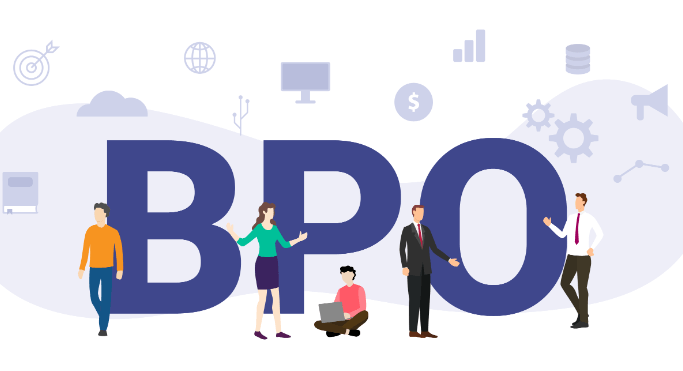
The intermediary service provider executes the ventures on the extremity. In the outsourcing sector, there are many vacancies for workers. Most of the trade-related tasks are performed by the intermediaries in the making of a successful institution. Many high-ranking conglomerates employ the BPO for productive, time-efficient, and high-standard outcomes. It also proves to be profitable when the workflow is at maximum, but the workforce of the company has few members.
Many youngsters in the modern world are opening their start-ups but need more experience, resources, and clients. These small companies use outsourcing amenities as these services are affordable and produce good results. The BPO services consist of two important management: the back office (includes administrative processes, organizing tasks and works that do not include client-company interaction) and the front office (includes the employees who directly contact the clients and give advice and solutions according to their requirements). The back office operations include account management, payments, data management, IT supervision, etc., while front office operations include call center helplines, sales, marketing, Public relations, etc.
The intermediary acts as a medium between the company and the customer and performs many other tasks. It can be one intermediary representing each customer or one vendor representing many individuals performing various significant responsibilities. For example- An organization uses outsourced services for account organization and payroll but uses its own team for human resource-related work.
Functions of BPO
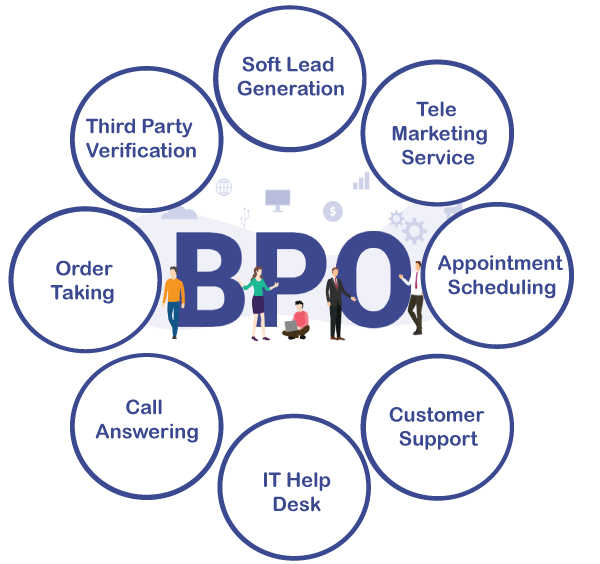
- BPO is known to be a profitable scheme because it includes work adjustability. The service providers utilize their non-essential operations while providing services for different organizations so the companies can use their major resources for core functions such as client interaction and production management. In the end, it leads to profitable results without the loss of many resources.
- Usually, BPO provides its services to companies that need access to highly technological resources or other services required to reach the end goal. The main purpose of the service providers is to improve their data management skills and business approach through the use of modern techniques.
- The Philippines has been known as 'The BPO Capital of the World' for several years. Companies around the world outsource services, including the Philippines, such as Wells Fargo, Microsoft, IBM, and many others. The Philippines utilizes services such as data entry, customer helplines, and other BPO operations. Other countries providing outsourcing services are India, Brazil, Poland, and Mexico.
- BPO allows companies to have the advantage of swift and precise exposition, better manufacturing, and the ability to utilize their resources on important tasks.
- BPO helps in improving revenues as this option of outsourcing is inexpensive. India is known to be participating in back office management and performing affordable jobs, and also many multilingual individuals can offer their services to refine the bottom line in India.
Types of BPO
There are three fundamental categories of BPO:
- Offshore outsourcing - When the services from the organization that originated in one country are outsourced to another far-away country, this kind of outsourcing is known as offshore outsourcing. Under offshore BPO, the service provider and the company can prosper due to the low cost and increase in production and stocks. There are also limitations to this BPO as there were many social, linguistic, and cultural inhibitions while dealing with foreign countries.
- Nearshore outsourcing - When the country in which the company resides is close to the country where the customer lives, this process of service provision is known as nearshore outsourcing. The benefit of this outsourcing is that as the countries are close to each other on the basis of geography, the service providers can cooperate with both the company and clients easily and interact with them.
- Onshore outsourcing - In this king of outsourcing, the service providers have a choice as the clients belong to the same country as the company they are associating with. Still, the service contributors belong to different regions or districts. This outsourcing is known to be time and cost-saving as the time zones remain the same, and clients have to travel for a shorter distance than for cross-country trades.
Tasks Requiring BPO Services
As mentioned above, BPO outsourcing can be used in many operations to create a successful business. Here are some operations that BPO outsourcing performs:

1. Business operations
In the trading sector, BPOs need to perform some repetitive tasks and outsource the service as soon as possible. Hiring BPO services is a cost-effective measure for an organization. The surplus can be used to improve the utilities of the company, which is advantageous for international conglomerates. These recurring outsourcing of data to the subject matter experts can help the company to focus on core projects. Some business operations performed by BPO are as follows:
- KYC process- KYC stands for Know Your Customer policy. It is an identity and verification test to collect data regarding the clients who have signed up for the services offered by the company so that an account can be maintained from then on. The basic necessities for this verification are address and identity verifications such as ID cards, biometric recognition, face recognition, document verification, passport, utility bill, etc. If the BPOs can assist the customers while they fill in their data, capitalists can focus on major businesses.
- Organizational Socialization- It is also known as onboarding. In this process, the organization hires new employees, teaches them new skills and structure, and gives them insight into the task. Then, the job of these BPOs is to gain more customers by outsourcing their services, such as lead generation and onboarding cab drivers or sellers. The four phases of employee onboarding are: Preboarding, Onboarding and welcoming new employees, Training, and Transition.
- Sales Order Processing- This process includes the tasks such as collecting the item, packing, and delivering the packed accessories to shipping transportation. The BPO's main task is order fulfillment. The order processing services are typically known as distribution centers. BPOs outsource the order processing services to the companies. Offshore outsourcing mostly needs BPOs who can speak English fluently and ship the packages to other countries.
2. Marketing
The selection of bright possibilities, formulating new schemes, and putting together the collaterals are the basic components of business enhancement and marketing. Marketing includes the ventures such as generating, connecting, and dispensing so that the company can attract more customers and gain profit. Marketing can be possible by thorough analysis, grabbing the interest of potential customers in business, and researching the commodities' properties. On the other hand, business enhancement includes a workforce that manages all the tasks, from collecting important data to follow-ups.
For better management conditions, the business and start-up institutions use outsourcing services so that the higher-ups can focus on the task at hand, which would be to grow the conglomerate and assist the clients, so they can invest in the business after getting the required information. Here are some strategies that the BPOs use to help the companies:
- Lead Generation- Lead generation is a method to gain more clients by making them interested in a product to increase the sales of the company. Through outbound calling and sending E-mails that include the details of the scheme and products, BPOs can help in generating leads for organizations.
- Research and Analysis- Market research combines the customers' needs with the present-day economic trends to formulate a business idea that would make the audience aware of the product's qualities. It decreases the risk of the sales going downhill and helps in preplanning the details. The outsourcing of market data helps the company to plan its next scheme beforehand and invest accordingly.
- Content Creation: It is a process of first creating an idea based on the information that the content creator gets, identifying the subject to write on, giving the created content a new shape, and strategizing the details. At last, the content is ready to be used in the form of blogs, videos, and posters. Marketers and industry leaders plan their business strategy to use their resources and time for activities such as campaign organization so that the brand can earn publicity even before it's in the market.
3. Accounting and Management
The two basic elements to supervise the business are financial assistance and managing resources and team. These components are very important for the development of an organization because, in the absence of these, there would be no resources and no revenues for employees to hold on to, and clients would not support the product. Some activities do not affect accounting and management highly, and these processes can be handled by BPO outsourcing such as:
- Record keeping and financial statement- It is the process of recording account-related activities such as transactions, client verification, business events, etc., in the form of a logbook in accounting dispensation. BPO outsourcing is the best option for a company to manage account books and maintain monthly accounts of clients' activities. Since it does not require daily attention, outsourcing can be effective service for it.
- Safety- Many security organizations are responsible for protecting the employees in another business organization. It is a process of signing a contract with a security institution that accepts the security needs of companies whenever required. Third-party security companies safeguard the properties of other companies during work hours as well as day-offs.
- Traveling - Traveling is known to be one of the main aspects of BPO outsourcing because companies have to organize business trips for the expansion of the company. There are travel agencies and websites for online bookings which transport employees and workers from home to other destinations for business projects at a lesser cost. Due to the arrangements made by BPO services, the finance department of the organization can save both capital and time.
4. Human Resources
The human resources division operates to hire new employees for the company and supervise the former ones. The job of an HR is to recruit, dismiss and train employees based on their work ethics. The HR department is accountable for setting up rules and regulations for both employees and industry leaders so that a healthy work environment can be acquired. These employees acquire competence in matters that are not business-associated such as creativity, commerce, linguistics, etc., and can be used as BPO services. HR manages these activities and assigns tasks to BPOs accordingly.
Here are a few outsourcing processes that can be profitable for both the company and outsourcing services:
- Hiring facilities- There are many organizations that help conglomerates hire hundreds of employees to facilitate non-core services such as catering service, sanitation, construction, entertainment, etc. On the other hand, the BPO facilities also gain resources from companies that they can use to improve their own work environment.
- Reference checking- Many HRs tend to check for employee verifications by calling and inquiring about the former employers of new employees. These processes are mainly for security measures of the data, not to endanger an employee's privacy. There are many radical offenses and illegal immigrants that go unnoticed by the radar, so the reference checking BPOs also consult with the nearby police authorities.
- Revenue administering - It is one of the processes requiring no professional guidance. It includes maintenance of monetary archives of how much each employee is paid per year, salary abstraction, and total monthly payroll. Most BPOs hire exempt employees (who work for fixed wages, as in there would be no extra revenues for overtime) rather than contractual ones. Therefore, BPOs can conveniently provide net pay to all employees working in the company.
Examples of BPO Facilities
Here are some companies that are well known for operating in outsourcing services:
1. Concentrix
It is an organization that attracts clients and helps other businesses to flourish by providing insights on various business-associated subject matters. This BPO is located in the United States. It consists of 80 companies that are listed under the Global 500 and has hired approximately 225,000 workers. Some operations of this service are- Designing, marketing, administration, IT utilization, statistics, etc.
2. Wipro
The Wipro BPO services are located in Bangalore, India, working towards making discoveries and creating innovations. Wipro is an MNC that provides consultation, mercantile outsourcing, and software services and has won many industrial honors. The Forbes Global 2000 acknowledged Wipro's role in providing services to them. Some of its partners are Adobe, Cisco, Data Stax, Microsoft, etc. Some of the services offered by Wipro are Workspace solutions, Cloud, Data Analytics, Cybersecurity, etc.
Advantages of BPO
- The flexibility of time for an organization using BPO services could be profitable as it leaves the industry leaders with time to plan their own products and services according to the needs of the client. They would not have to guide the employees directly in completing business-related tasks. As reported by the survey of Deloitte in 2022, outsourcing is practiced and approved by 40% of companies around the world.
- BPOs can help the company in managing and save funds. The BPOs cost little, and the companies do not need to provide finances for goods constitutive operations such as renting equipment or office staff. Small businesses and start-ups prefer to hire BPO services as these services use their own resources to get the work done.
- As reported by Deloitte in 2021, 88% of the proficiency of operations increases in the company by appointing BPO. This is due to the fact that BPO workforces are trained in the tasks by the experts for outsourcing beforehand. Also, due to the proficient workforce, assignments can be completed on time.
Disadvantages of BPO
- Most of the time, companies need to give more importance to outsourced services. However, these services are disregarded because of other vital affairs. Due to this negligence towards BPO services, the costs of BPOs could later increase because the company failed to consider their terms and conditions.
- Cyber attacks can occur in many IT-associated companies, and it is mostly up to BPOs to take cyber security measures. However, the company needs to be cautious of the equipment and software used by the BPOs in providing security to avoid data glitches.
- The use of outsourcing services should be at limited measure because it can result in over-dependence on BPOs, which leaves out the organizations unprotected from takeover from foreign companies. Due to an intimate and long-term association with BPOs, companies tend to get highly reliant on outsourcing.
- As mentioned above, offshore outsourcing can result in many obstructions due to the difference in geographical regions and time zones between the BPO and the organization. The outsourcing company needs to help understand the requirements of the company due to the language barrier and give results accordingly.
KPO
Knowledge Process Outsourcing is the technique of outsourcing effective business procedures associated with particulars that is relevant for a corporation to grow within the market. It also plays an important role in forming the essential share of a conglomerate. The KPO workers must acquire expertise in analytical and technological aptitudes and a long course of occupational experience.

The requirements of KPO services in business development are proficiency in technological devices, growth in manufacturing resources, and financial management. Countries renowned for their KPO facilities are India, Poland, Sri Lanka, the Philippines, and Romania.
Functions of KPO
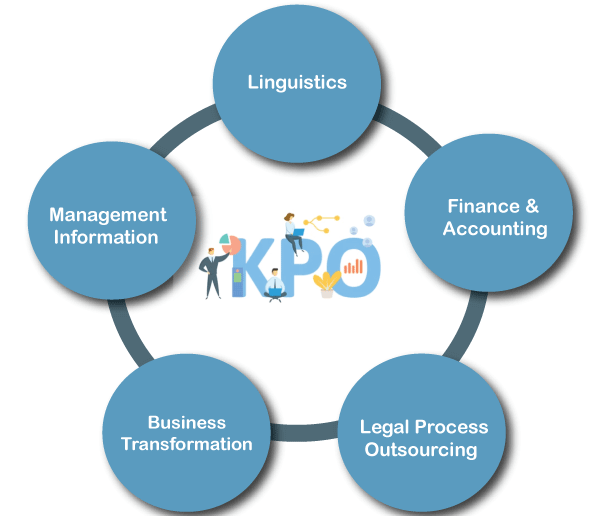
- Knowledge Process Outsourcing involves the detailed administration of tasks that require a high amount of expertise, including specialization in a technical development sector and advanced analytical skills to a mediator organizational service. The KPOs need to be highly experienced in business endeavors so that the business can expand in foreign countries.
- Even though KPO is not much varied from BPO, as it involves supplying cost-effective and time-saving labor so that employers can handle the core matters, it involves wider knowledge for coming up with strategies for business management and helping the industrial administrators with specific subjects.
- The employees who perform repetitive tasks are not involved in KPO services as the corporation requires practicians who are highly skilled in specific operations and do not need to be trained by the HR department for projects assigned to them. The addition of experienced employees to the company results in the spirit of competitiveness among the employees and an increase in payroll. Through this technique, the company does need to hire experts from each specific sector permanently to get the required projects accomplished.
- Companies, while hiring KPO services offshore, determine that the candidates should be experienced in business-related affairs as a cost-cutting scheme. These services are for skilled workers who are earning lower wages in their own country, so they can progress by working offshore. Usually, if companies want to hire skilled employees at low cost in bulk, they use KPO services
- Corporations move towards advancement by enhancing their production to receive a high yield in less finance. Also, the KPO facility maintains its competitive environment for the employees to make progress.
Responsibilities of KPO Services
Here are some general sectors for which KPO can be used:

1) Data Analytics
It is a process through which a huge amount of raw data is interpreted into a utilizable form so that the information picked out can be used to get to conclusions on various subjects. The data is usually in an unorganized form and collected from various sources. There are other aptitudes required for working as KPOs such as technological research efficiency, financial management, etc.
2) Technical Evaluation
It is the process of analyzing the data to determine which sector to invest in through the charts indicating the price structure. The data previously recorded is considered for analyzing the result and deducing the future outcomes in the stock market. It is because more than the skill of technical analysis is needed to become a professional retailer; individuals can obtain better opportunities by excelling in many other sectors and providing KPO services to other conglomerates.
3) Financial Guidance
Financial counseling is the method to manage the investment by consulting with professional agents regarding the matters such as financial estimation, capital for expensive purchasing, retirement funds, and investing in the market. The KPOs are trained in fulfilling the requirements of their clients and advising them to invest in the product offered by the company. On the other hand, they function as a business consultant for the company by advising cost-effective measures.
4) Business Campaign
The activities that are utilized by organizations to manufacture goods and services are known as business operations. It includes resource management, quality check, marketing, distribution, planning, and coordination with others. The KPOs need to be well-trained in business-associated matters to resolve the challenges and make the company progress.
5) Healthcare
Technology has been an important factor in the progress of medicine and healthcare services. Many online pharmacies, healthcare registration management, mobile apps, and transcribing amenities are the elements of improvement in healthcare business management. Prominent hospitals require an IT department, administration department, marketing department, and so on to progress, and KPOs could assist in those matters.
Examples of KPO
Due to globalization, KPO services are advancing all around the world. Many companies from the business industry have started using KPO services as it adds to their profit. Today India plays important in web development, and hence, this sector requires a large workforce. Here are some companies that provide KPO services to other organizations.
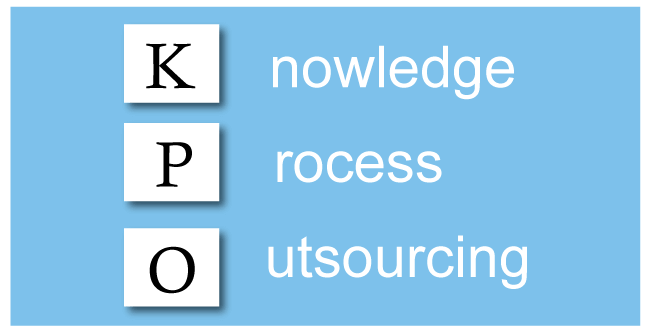
1. Genpact
It is one of the high-ranking companies. This company governs a wide range of operations for Generic Electric Capital and also assists in the global production of resources. It also helps pharmaceutical organizations, IT firms, fast-moving consumer goods agencies, and communication agencies by allocating their services. Genpact is one of the leading service providers for companies in the Fortune 500. Some services provided by Genpact are Project tracking, data generation, business management, formulating customer relations, and analysis.
2. Mindtree
Mindtree is an Indian MNC that deals with matters of technology and business consultation, and it is located in Bangalore. It is partnered with Larsen and Toubro Group. It trades in fragments of the business sector, such as the stock market, home electronics, travel industry, mobile applications, data analytics, resource management, and accounting. The services offered by Mindtree are maintenance of the mobile application, production management, technological research and development, infrastructure management services, and digital resources.
Advantages of KPO Services
- The training and production cost is decreased due to employing professional and versatile candidates and coming up with new strategies and well-organized project structures.
- The productivity of the company is increased because the employees don't need to work in particular departments such as management, strategy, finance, etc. All employees can provide their insights on an assigned project, and their teamwork provides better outcomes.
- With the adjustability that exists in the KPO industry, the manpower can be reduced depending on the project. In case the company lacks resources and proceeds toward bankruptcy, a selected number of human resources can be relieved.
- Alternatively, the company can rapidly add staff and increase production and revenues.
- The KPO practice adjusts well and sharply to changes in its competitive environment.
Disadvantages of KPO Services
- Confidential data could be compromised if the information is stolen, duplicated, or sold to the opponent organization.
- The temperament of the outsourced workers remains unknown to the company, and even after detailed background research, some employees can pass through the radar.
- For establishing a prosperous organization, a high amount of resources and finances have to be invested. KPO services require a great deal of time and money to flourish.
- There could be linguistic, cultural, and geographical barriers between clients and KPO employees. Therefore communication can be an unsettling matter.
- The existing workers can be alarmed due to the hiring of KPO employees as they would fear losing their job.
Difference between BPO and KPO
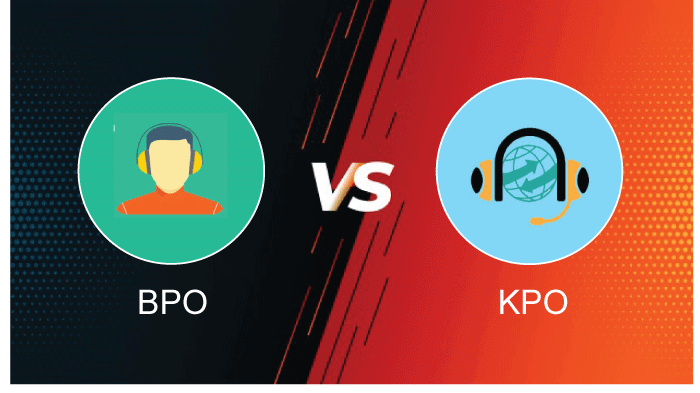
| BPO |
KPO |
| It is an abbreviation for Business Process Outsourcing. |
It is an abbreviation for Knowledge Process Outsourcing. |
| The BPO services comprise customer care helplines, resolving technical issues by using voice support, Tele-commerce, etc. |
It includes the outsourcing of significant details associated with trade. |
| The requirements for BPO are competent communication and technical skills. |
The KPO service requires specialized proficiency in various subjects such as business, problem-solving, production, finance, etc. |
| BPO consists of repetitive services that do not require specialized training or business understanding. |
KPO requires a thorough understanding of the business so the workmen can provide advice according to the situation. |
| These are the low-end services. |
These are high-end services. |
| The workers can have few qualifications to acquire employment. |
KPO consists of employees who generally possess advanced degrees and specializations in a particular field. |
| It generally requires expertise in the process. |
The general requirement is knowledge. |
| It relies on cost arbitrage. |
It relies on knowledge arbitrage. |
|








 For Videos Join Our Youtube Channel: Join Now
For Videos Join Our Youtube Channel: Join Now









